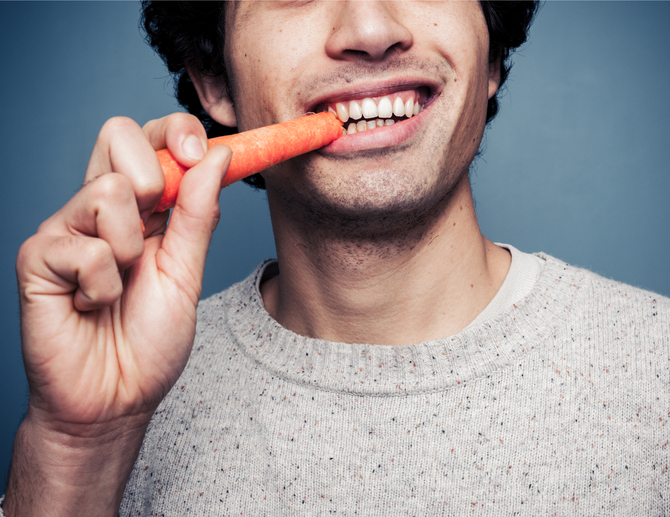Stressed about your thinning hair? Eat your feelings
When people notice thinner or weaker hair, they stress about it. Hair loss can lead to stress eating, which is generally seen as a problem. Eating your feelings about the health of your hair might actually solve the problem, though. Certain foods are linked to stronger, thicker hair. Consuming a balanced diet and intentionally giving your body the right nutrients promotes healthy hair growth. The terms linked to hair growth read like a nutrition label that nobody really understands, but the foods are everyday grocery items that also taste delicious.
Omega-3 fatty acids
Salmon, sardines and other kinds of fish are high in omega-3 fatty acids. The term “fatty acids” seems like something to avoid, but you need these healthy fats. Your body gets omega-3 from food or other supplements and uses it to give your hair a natural shine. Fatty acids nourish the oil glands around your hair follicles, which hydrates your hair as it grows. Omega-3 fatty acids are also known to relieve depression and help your heart. If you don’t like fish, flaxseed also has high amounts of fatty acids.
Beta carotene
Beta carotene is another way to get naturally shiny hair. Your body turns this antioxidant into vitamin A, which helps oil glands in your scalp make sebum. Sebum keeps your hair from drying out and looking dull. When you’re looking for sources of beta carotene, think carrots. Carotene. Carrots. Orange vegetables like carrots, pumpkins, sweet potatoes and mangoes all have a good amount of this antioxidant.
Protein
Protein is fundamental for cell growth and repair, which means it works to strengthen your hair. Every day, men and women naturally lose several strands of hair. If they’re not eating enough protein, their body won’t be able to replace them. This can lead to noticeably thinner hair. Chicken, quinoa and Greek yogurt are all foods that are packed with protein. Greek yogurt has the added benefit of vitamin B5, which gets the blood flowing to your scalp to promote hair growth. Active growth will leave you with a head full of thick, healthy hair.
Biotin
Biotin is a B vitamin that’s essential for healthy hair growth because it helps your body build proteins. Naturally found in eggs, avocados, almonds and salmon, biotin is necessary for strong hair and nails. Most people don’t consume the recommended amount of biotin in their daily diets, but supplements are available.
Iron
Significant hair loss can indicate a problem with your iron levels. Even though lots of foods supply your body with iron, iron deficiency is a common problem. Clams, oysters, beans, spinach and certain cereals are all rich with iron. If you pair your iron-rich foods with sources of vitamin C your body will be able to absorb more of the iron. This will help your body fight against iron deficiency and grow strong, healthy hair. Lean red meat has high amounts of iron, plus the added benefits from zinc.
Zinc
Similar to an iron deficiency, without enough zinc your cells will be too weak to produce strong, healthy strands of hair. Adding more zinc into your diet will balance hormone levels and reduce dandruff on your scalp. Zinc contributes to DNA and RNA production. Those are science words that basically mean your hair follicle cells need zinc in order to grow hair. Foods with high amounts of zinc include pumpkin seeds, nuts, spinach, sweet potatoes, and eggs.
Vitamin C, cinnamon, and vitamin D
Other delicious foods that can help your hair grow stronger and healthier include strawberries and cinnamon. Strawberries are high in vitamin C. Vitamin C works to build proteins in your body, and proteins are necessary for hair growth. Cinnamon stimulates blood flow, which carries more oxygen to your hair follicles. Studies also link vitamin D with active hair growth. Although not often found in food, you might catch the sun’s rays while you’re walking to the grocery store.
Consuming a balanced diet that’s full of nutrient-rich foods helps promote healthy hair growth. The vocab words linked to these benefits read like a nutrition label, but the foods behind these confusing terms are delicious. Relieve your stress related to thinning hair by taking a trip to the grocery store. Your stress eating just might solve your problem.
Omega-3 fatty acids
Beta carotene
Protein
Biotin
Iron
Zinc
Vitamin C, cinnamon, and vitamin D
Other delicious foods that can help your hair grow stronger and healthier include strawberries and cinnamon. Strawberries are high in vitamin C. Vitamin C works to build proteins in your body, and proteins are necessary for hair growth. Cinnamon stimulates blood flow, which carries more oxygen to your hair follicles. Studies also link vitamin D with active hair growth. Although not often found in food, you might catch the sun’s rays while you’re walking to the grocery store.
Contact Info
9777 S. Yosemite Street, Suite 200
Lone Tree, CO. 80124
303.680.8989
Email Us
Hours
Monday - Thursday: 8am - 5pm
Friday: 8am - 4pm
